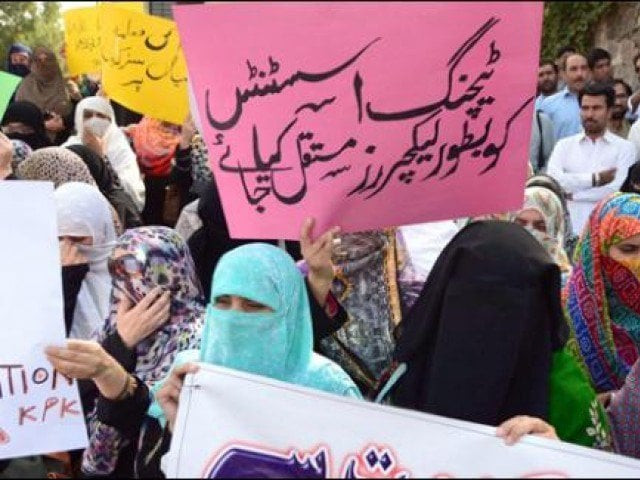Illegal appointments: Contractual teachers challenge decision
File petition in Islamabad High Court for implementing the notification passed on February 8, 2013

PHOTO: File
Petitioners through their counsel Hafiz SA Rehman have challenged November 1 judgment of IHC’s single bench comprising Justice Athar Minallah.
Rehman has prayed the court that Justice Minallah’s judgment may be modified by mentioning the facts of the case of the appellants and direction be passed to respondents for implementing the notification passed on February 8, 2013 — which is still intact.
Appellants have also prayed the court that they be allowed to join duties against their respective posts from the date of the notification as regular employees and they be paid their regular salaries, allowances and all other back benefits from the date of the notification.
Much-awaited move: 20 Islamabad teachers promoted
They have further prayed the court during the pendency of the Intra-Court Appeal (ICA), respondents may be restrained not to take any adverse action against the appellants and post may neither be advertised nor filled up in any manner whatsoever.
In the petition, the counsel said that the daily-wages teachers had sought court’s intervention for joining but the single bench has not given its verdict on this particular point. Instead, he said, their appointment had been declared illegal.
Justice Minallah had declared that all daily-wage staffers — who were appointed at government schools and colleges in the capital without following due procedure and observing principles of transparency —illegal, void and tantamount to misconduct on part of the appointing authority.
However, daily-wage staffers — who were appointed through a transparent recruitment process and have been demanding their regularisation in basic pay scale grade 1 to 15 — shall be scrutinised by their respective departments in light of a recent policy.
Further, he said, each petitioner shall be granted a fair hearing and that each case shall be considered and decided by the relevant competent authority within 90 days.
This Pakistani girl left her six-figure job in Islamabad to teach children in Hunza village
Teaching staff appointed at various schools and colleges on daily wages, contracts or as contingent staff in grades 16 and above had gone to court seeking regularisation of their services.
The longstanding issue of nearly 2,000 daily wage and contractual teaching and non-teaching staff in the capital has been lingering for years.
Despite having gone through several rounds of discussion in various parliamentary committees and the even debated on the floor of the parliament, little had been done to resolve their grievances.
The court, after holding a number of hearings since February this year, had concluded proceedings on August 2. It subsequently withheld its decision on miscellaneous petitions which were announced on November 1.
While they pinned their hopes on the courts, the decision by Justice Minallah provided little relief to the petitioners.
Justice Minallah noted that teachers who were appointed without any prior advertisements of posts but have served for a considerable time were deserving of care from the federal government.
IIUI teacher probed twice for violence appointed HoD
The current state of public schools and colleges in the capital is so abysmal that the privileged classes of society, particularly those from the policy-making segment, seldom send their children to government-run institutions, observed Justice Minallah.
“[This] court can only wonder whether the chief executive of the country, the in-charge minister or the concerned federal secretary would enrol their children in public schools where teachers are appointed on a daily-wage basis, and that too in a non-transparent manner and paid out of the student fund,” Justice Minallah observed.
“The fundamental rights of every student enrolled in a public school would stand protected the day the chief executive of this country, the concerned federal secretary and other privileged persons feel confident about enrolling their children as students in these public schools,” he stated.
He added that enrolling children of senior government officials may perhaps be the only test which confirms whether the fundamental rights of every child enrolled in public schools are secure.
Justice Minallah termed this as a classic case which clearly indicates the priority given to public schools by policymakers, the federal government and the Parliament.
Published in The Express Tribune, November 19th, 2017.



















COMMENTS
Comments are moderated and generally will be posted if they are on-topic and not abusive.
For more information, please see our Comments FAQ